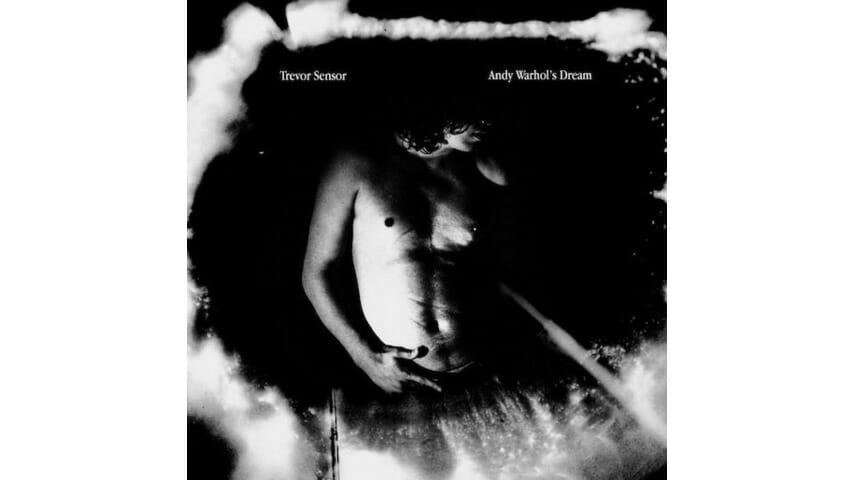
The legend of Trevor Sensor began inside a small bar in a near-forgotten town at the edge of a flyover state. By happenstance, Killers’ guitarist Dave Keuning caught Sensor on stage in Pella, Iowa and decided to introduce himself. Little more than a year later, after releasing a pair of EPs and garnering an opening slot on the Family Crest national tour, the ascendant artist has a national audience awaiting the release of his debut album.
More than just a grand story, it’s damn near inspirational; a necessary corrective for trending suspicions that successful singer/songwriter careers are now dependent upon nepotism or marketing strategy. The very idea of Trevor Sensor signing with tastemaker label Jagjaguwar serves as bulwark against the rising tide of pretty young things hawking high-gloss, lowest-common-denominator banalities. Sensor isn’t quite coverboy pretty, his voice is difficult, and songs haven’t scored any notable licensing deals. Still, as Andy Warhol’s Dream makes clear, he is so very young.
Trevor Sensor does not, of course, sound young. It’s hard to imagine the 23-year-old ever did. Gifted a preternaturally-distressed voicebox all the more resonant for showcasing its own bristling limitations, he’s burnished his rasp with a fluid polish that smoothes even the roughest edges—think: lacquered driftwood or acid-washed denim couture—while deftly manipulating his melodies to ensure those vocals are always heard to their best advantage. Straightforward songs and complicated singing wouldn’t be the worst Sensor report, but his tunecraft has grown progressively stronger since the piano balladry of Texas Girls And Jesus Christ or Starved Nights Of Saturday Stars’ jagged folk.
Produced by Jonathan (Foxygen) Rado, Brandon (Imagine Dragons) Darner, and Richard (The Shins) Swift, recorded at Steve Albini’s Chicago-area studio Electrical Audio with backing from Whitney mainstays Julie Ehrlich and Max Kakacek, the album’s packed with indie royalty, and Sensor makes the most of the bigger sound. “High Beams” leans back for an ambling ‘70s groove, and there’s a bluesy barroom kick to “In Hollywood, Everyone Is Plastic.” Most impressively, above sweetened backing harmonies and psych-inflected Mellotron, he carves out a genuine country-rock anthem on “The Money Gets Bigger.” But the insistent ridicule of luckless protagonists desperate to “be someone tonight” curdles all the the demonstrable gains in musicianship.
All things considered, Andy Warhol’s Dream stands as promising first effort for an aggressively intelligent wunderkind climbing the shoulders of giants, but it’s also a wearyingly wasted one that betrays a troubling self-satisfaction. Asking our poets of the underclass to stay in their lanes always seems reductive, and there’s little sense complaining an artist’s first full-length work represents an unwelcome change of direction. All the same, there’s a reason we’re here apart from workshopping wafer-thin screeds against the shallowness of consumerist society. Whether or not a rust belt boyhood heightens empathy or broadens one’s frame of reference, Sensor’s ties to the decaying former “Hardware Capital of the World” on some level bolstered the tales of boozy misanthropy spilled over his early releases—veneer of authenticity burnishing narrative voice as much as his actual one—but what once seemed blinkered commitment to characters here reads as postgrad twerpiness.
Frankly, when impassioned sincerity is your most salable feature, Andy Warhol should probably be avoided altogether. In the glam-shaded title track’s exploration of ”Andy’s little dream,” Sensor asserts “everybody wants to be in a magazine,” but the sentiment rings hollow. (Considering his big break came via a celebrity fan, it’s also sorta mean.) Warhol’s famous-for-15-minutes quip was only ever a passing whimsy the artist lived to regret as it came to falsely define a career borne upon abstracted commentary. Near meaningless in the best of times, here it’s just a false flag sanctifying sneers over the plastic and jaded, whomever they may be. Warhol had another well-known quote rather more pertinent and far more damning: look at a thing long enough and it loses all meaning.